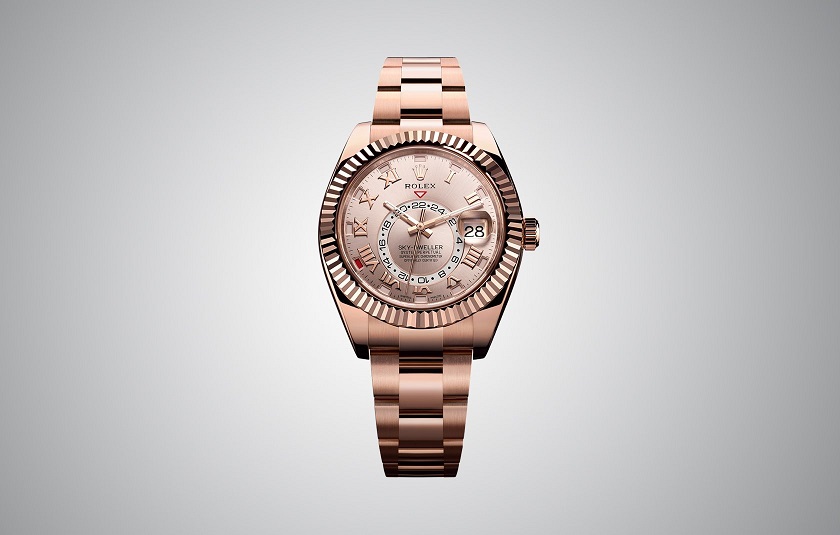Luxury watchmakers have long wrestled with one very prominent set of opponents – counterfeiters, the often-Chinese entities that actively saturate the market with “Rolex” watches with hands that tick instead of glide, lighter-than-usual “Audemars Piguets,” and improperly engraved “Patek Philippes.” Over the past decade or so, an assertive new foe has arisen: a jeweler to the stars claiming exclusive rights in the words “red gold,” and waging an increasingly aggressive war against nearly every major watchmaker – from Cartier and Piaget to Breitling and Rolex – in the process.
When jeweler Chris Aire opened the doors of his eponymous jewelry company 23 years ago in Beverly Hills, rose gold was far less popular than it is today. “You couldn’t give rose gold away before we started branding it,” he told Bloomberg years later. The branding that Aire is referring to included calling the pink-hued gold-copper alloy “Red Gold,” which he says is a more masculine way to describe it.
In the fall of 2003, on the heels of Aire and his intellectual property holding company Solid 21 Inc. filing to register the “Red Gold” name as a trademark for use on watches and jewelry with the U.S. Patent and Trademark Office, they were issued a registration.
While Aire has built up a client list that has included Jamie Foxx, Angelina Jolie, Eva Longoria, Halle Berry, Jay Z, and Clint Eastwood, the brand really started making headlines in 2010 when Solid 21 filed suit in a California federal court against Rolex, LVMH Moët Hennessy Louis Vuitton, Richemont, and Omega, among more than a dozen other companies. According to the complaint, nearly 20 different watch brands were using the words “Red Gold” in connection with their products without its authorization.
That suit – which was eventually split into a number of different cases – kicked off a lengthy and ever-growing chain of multi-million dollar trademark infringement cases that have dotted court dockets across the U.S., in which Solid 21 asserts that it has the exclusive right to use the “Red Gold” trademark. Solid 21 filed dozens of lawsuits between November 2010 and December 2013, alone, against the likes of Bulgari, Ulysee Nardin, Chopard, Pierre Kunz, and Franck Muller, among others. Even more would follow.
Of the many cases filed, one landed Hublot owner LVMH on the receiving end. With a fierce team of both in-house and outside counsel, LVMH sought to establish that the “Red Gold” term is generic when it is used in connection with jewelry and/or watches, and thus, it is not protectable as a trademark regardless of whether Solid 21 can show that consumers have come to associate the term with it and its products.
To bolster the argument that “Red Gold” is merely a generic term to describe rose gold, counsel for LVMH pointed to a dozen different patents that use the term “red gold” to describe the material of jewelry or watches, and more than 60 different articles that use the term “red gold” in a generic manner.
“To grant trademark status to a generic term essentially gives a single user a monopoly and prevents all other manufacturers from accurately identifying their products,” LVMH argued in a 2014 bid for interlocutory review. Ultimately, LVMH and Solid 21 resolved the matter and entered into a confidential settlement agreement in 2018, following more than 8 years of proceedings before federal courts in California.
The Solid 21, LVMH settlement came roughly 5 years after Aire and co. settled the virtually identical suit they filed against Breitling. While it appeared as though Solid 21 and Breitling had resolved their differences by way of a October 2013 settlement agreement, Solid 21 reignited the fight and filed a new suit against the Swiss luxury watchmaker last week in a federal court in Connecticut.
In something of a déjà vu filing, Solid 21 claims that Breitling’s use of the words “Red Gold” in its advertising constitutes trademark infringement and dilution, as well as false designation of origin. It turns out, the case that the two parties had settled was dismissed without prejudice, meaning that Solid 21 could bring the same claims against the same defendant again in the future. And that is precisely what it has done.
This repeat lawsuit tactic is hardly a novel one for Solid 21. Less than one year after entering into an out-of-court settlement with Cartier, Jaeger-LeCoultre, Officine Panerai, and Piaget’s parent company Richemont in 2011, Solid 21 filed suit against the Swiss conglomerate again for allegedly infringing its “Red Gold” trademark.
In that case, just as in the many others that preceded and have succeeded it, Solid 21 claims that Richemont’s “use of the ‘Red Gold’ mark in the design, manufacturing, marketing, advertising, and/or sale of their products is likely to cause confusion” amongst consumers as to whether “Solid 21 is somehow affiliated, connected, or associated with Richemont” and its products. As a result, Solid 21 argues that it “has suffered and will continue to suffer irreparable injury to its business, reputation, and goodwill, and will sustain loss of revenue and profits, while [Richemont] profits from such prohibited use.”
All the while, Solid 21 has routinely asserted – including by way of many strongly-worded press releases circulated by its public relations arm – that the “Red Gold” trademark is synonymous with Chris Aire and its upscale offerings. Yet, as the brand’s name continues to appear on complaints in courts across the country, Chris Aire and Solid 21 are arguably becoming far better known for their litigiousness than any type of jewelry offerings.











